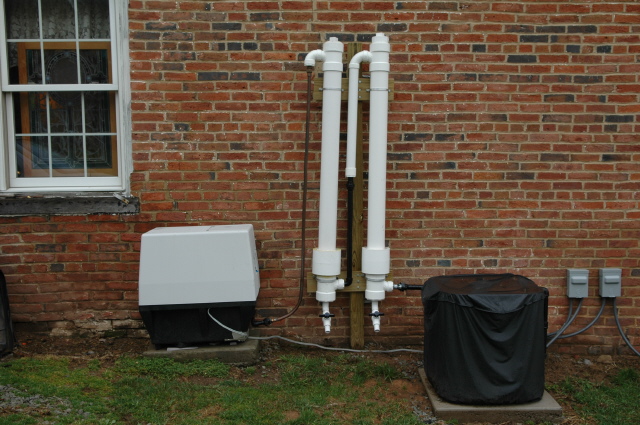|
Backround
Commercially bought natural gas is pretty clean and dry, however well gas is not. I am fortunate that Pennico Oil & Gas roughly filters the  wet dirty gas enough so it does not do damage to their pipe lines and my house hold appliances. This filtering is done before it is released into there connector line. I receive my gas from the connector line so 80% of the battle is over. However the gas is still dirty enough to cause my FuelMaker C3 compressor to prematurely wear out and gunk up the natural gas components of my bi-fuel Cavaliers. This process occurs when the natural gas is compressed by the FuelMaker. Small traces of water vapor are condensed into liquid under high pressure. This water will end up in the compressor, CNG tank and fuel system. wet dirty gas enough so it does not do damage to their pipe lines and my house hold appliances. This filtering is done before it is released into there connector line. I receive my gas from the connector line so 80% of the battle is over. However the gas is still dirty enough to cause my FuelMaker C3 compressor to prematurely wear out and gunk up the natural gas components of my bi-fuel Cavaliers. This process occurs when the natural gas is compressed by the FuelMaker. Small traces of water vapor are condensed into liquid under high pressure. This water will end up in the compressor, CNG tank and fuel system.
Solution
My original intent was to purchase a commercial setup or find a used unit on Ebay. I found both of my C3's and both of my Cavalier's there. Chances are good I could find a used dryer, however it became apparent that commercial units were designed for high pressure and high cost. These units were more than what I wanted to spend and larger/heaver than what I wanted to deal with.
I decided to find out what Fuelmaker would sell or recommend. I contacted Fuelmaker and they advised me to talk with a local dealer. When I contacted my local dealer, in Pittsburgh, they informed me that, "They did not deal with Fuelmaker any more." However they gave me the name of Clayton King of Royalty Enterprises, Inc. who services Fuelmaker products. I contacted Clayton and asked for his recommendation. He advised me to build one myself. He gave me a rough idea of what needed to be done, the methodology behind it and that McJunkin Appalachian could supply the Desiccant tablets.
I contacted Mark Rohrbrough of McJunkin Appalachian and explained what I was doing. He advised me to add a Coalescing Filter before the Dryer to protect the desiccant tablets from oil vapor and other trace Hydrocarbons. These impurities will coat the tablets and
|

